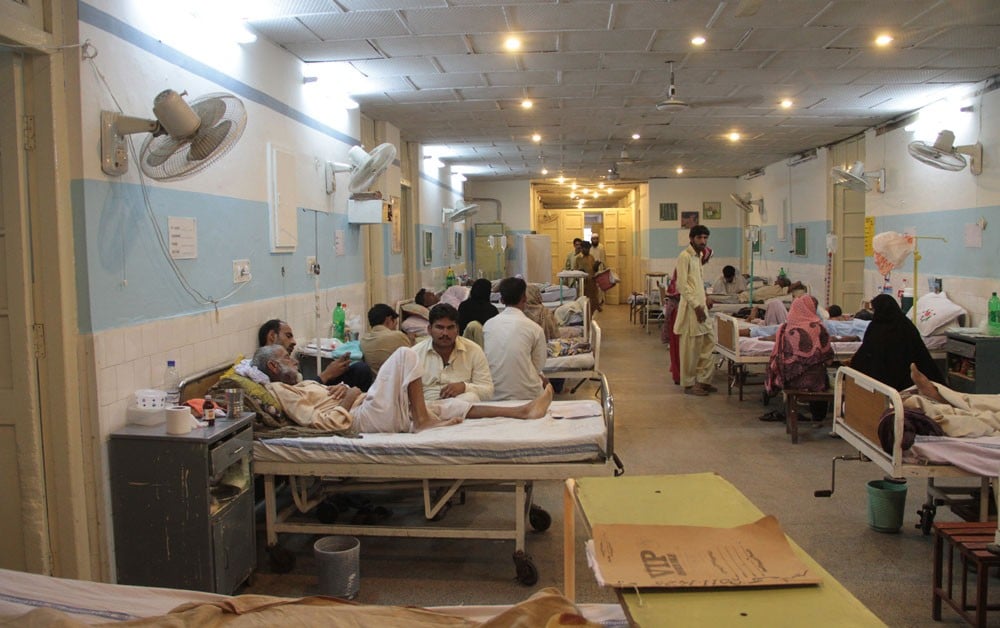
The PHC’s move to register healthcare service providers and establishments in order to implement its Minimum Service Delivery Standards has irked most medical practitioners who believe they were already working under a relevant regulatory and registration authority

Applicants waiting inside the Punjab Healthcare Commission (PHC) office are no quacks; they are qualified healthcare service providers. But they have been called in for the hearing. Barring two or three medical practitioners, the rest have come all the way from Rawalpindi, Okara, Pakpattan, Bhakkar, Sahiwal and other far flung areas.
Apparently, the Punjab Health Department’s drug inspectors sealed their healthcare establishments (HCEs) that include hospitals, medical clinics, nursing homes, maternity homes, dental clinics, Tibb clinics (hakeem khana), homeopathic clinics and any other premises used for providing services. Their cases were then sent to the PHC office in Lahore, where they have been summoned. A fine is to be imposed on them, following which the healthcare service providers shall get themselves registered with the PHC so that their establishments can be de-sealed.
Till only a few months ago, the HCEs were sealed and, later, de-sealed at the district level and the healthcare service providers were not required to come to the PHC office in Lahore.
Today, the process of de-sealing has become very complicated and long-winded. A healthcare service provider, whose facility is sealed, has to now come to Lahore first, no matter how far away he is based. Secondly, he has to fill a PHC form to get the license to run his facility, whether or not he has the license or registration done from a relevant council like the Pakistan Medical and Dental Council (PMDC), the Pakistan Nursing Council (PNC), the National Centre for Homeopathy (NCH), the National Council for Tibb (NCT) and the Punjab Medical Faculty (PMF).
Finally, he is supposed to pay a fine which may be between Rs20,000 to Rs500,000, depending on the nature of the offence. The entire process takes up to six months, which means a sealed healthcare facility is re-opened after a gap of at least two months.
According to a medical doctor, earlier when a healthcare establishment was sealed for an offence at the district level, it was de-sealed within a week’s time and against a very small fine. "My question is, in the presence of the Punjab Health Department, what was the need to set up another regulatory authority [PHC], especially when the former already has its inspectors, officials and mechanism in place to implement health standards," he asks.
A homeopathic doctor seconds him, "The PHC is a burden on the government as it is meant for a job that the health department is doing already, with a larger staff.
"The PHC has started issuing licences to private clinics, hospitals, homeopathy and herbal clinics despite the fact they have their own government-recognised associations such as the PMDC, PNC, NCH, PMF and NCT.
"With the emergence of the PHC, the abovementioned organisations should either be rendered ineffective or redundant. Private sector doctors, homeopathic doctors and hakeems also have to get licenses and register themselves with these organisations," he adds.
The PHC’s move to register healthcare service providers and HCEs to implement its Minimum Service Delivery Standards (MSDS) has irked most medical practitioners who are of the view that they are already working under a relevant regulatory and registration authority. They view the registration and licensing an additional burden on them as well as the patients.
Ali Raza, a Tibb practitioner from Okara, tells TNS that he has been to Lahore thrice in connection with the de-sealing of his dawa khana that was sealed because its license had not been renewed.
"I got my license renewed from the NCT, Islamabad, and showed it to the PHC which asked me to register with the PHC and pay a fine worth Rs20,000 before my clinic could be de-sealed," Raza says.
A homeopathic doctor from Sheikhupura says, on condition of anonymity, how his clinic was sealed and he was fined Rs35,000 though he possessed a license issued by the NCH.
"The district drug officers sealed my clinic and referred my case to the PHC which fined me for not possessing their license," he said.
Medical practitioners are of the view that the PHC’s MSDSs should first be implemented in the public sector HCEs where incidents of rat bite have been reported and the rate of infection at their operation theatres is very high.
On August 13 this year, the PHC teams sealed five operation theatres of Lahore General Hospital over high infection rate, he reveals. "The healthcare service providers, particularly from remote areas of Punjab, say the district hospitals and government basic health units are situated far away from the villages and there is no easy access to them. In this situation, a qualified medical practitioner, having a diploma from a government recognised institution, provides first aid to the patients at his clinic. What is wrong in that? But the PHC is on a sealing spree."
A PHC official, requesting not to be named, says that the Commission under the PHC Act 2010 issues license to a healthcare establishment for use at any of their premises.
When asked as to why the PHC does not have its offices in other districts, the official says the government has plans for that.
Mir Khalil-ur-Rahman Memorial Society Education and Health Editor Wasif Nagi says the PHC could only become effective when it takes action against private as well as government sector facilities in order to ensure its SOPs.
"Whatever punishment is due to a private hospital or healthcare establishment as per the PHC rules should be awarded to the public sector facilities," he adds.